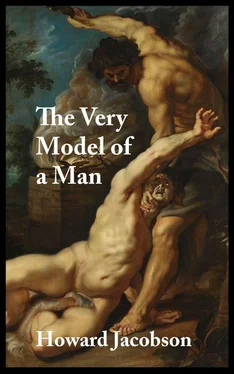But the room is close and still, without draughts.
‘At least steal something from me,’ he implores. ‘Take —’
‘That you may be given?’ Cain looks about to see if there is anything he has use for, and then remembers that the only thing he needs is round his shoulders. ‘All right,’ he says. ‘I owe you for your kindness. I’ll keep the gown. In return you may have the rag.’
A tremor passes over Raziel’s body. Even where the hairs have been pulled out in agitation, he ripples like corn. ‘Praise be to Thee, O God of heaven and hell,’ he hymns, ‘who permittest what is forbidden, who allowest the cruel to subdue the meek, and the wicked to teach their ways to the good. He robs me and — behold! — I am richer.’
Before he leaves, Cain notices that Raziel’s pale, pointed okra pod has begun to stir and rise… like a ziggurat… godwards.
Abstract and brocaded, he runs into Sisobk on the stairs.
Gleaming and in tatters, Sisobk drops to his knees and embraces Cain’s feet. ‘You saint,’ he says, ‘You martyr, you tower —’
‘Get up,’ Cain tells him. ‘I see that in one night you have reduced my clothes to the condition of your own.’
‘And I see that in one night you have raised mine to the condition of yours. Didn’t I say we were the perfect complement to each other!’
‘You should not have stolen my clothes. And you should not have inveigled me into this House.’
‘I only invited you. You came of your own accord.’
Cain thinks: no, I didn’t — I was nudged. But what he says is, ‘And that is exactly how I am leaving it.’
‘Not yet. Wait till you hear…’ Sisobk pulls at the hem of Raziel’s robe. ‘Wait till I tell you what I’ve done.’
‘Not if it involves watching you moving your mouth. I think I will not mind if I never see a human mouth move again.’
Sisobk is only too willing to cover his. Don’t his fingers fly naturally to his betel-stain moustache anyway?
‘Didtfyou,’ he says, behind his hand. ‘Didwayoudvdon. Iraisdmarm.’
‘And not if it involves listening,’ Cain says. ‘I think I will not mind if I never listen to a human voice again.’
‘Buisabouyou.’
‘Especially if it’s about me.’
He turns, trusting his feet blindly to the rotting stairs.
Sisobk follows, freeing his mouth, making a final lunge for Raziel’s robe. ‘I did it in your name, and in your clothes, and with your brother and your God goading me.’
A deaf man, Cain continues his descent, past the gourmandiser, past the twitching shadow, through a crowd arguing the sex of the Demiurge. ‘Like unto a hermaphrodite He is…’
‘I don’t know how you stood it,’ Sisobk calls out. ‘Having those two dinning in your head. One too old and one too young. One angry every day and one grateful every minute. And both resenting you because you wouldn’t play give-me-thank-you with them. How did you stand it for so long? How did you hold out? I couldn’t. I didn’t!’
But Cain has found the daylight and is off, breathing hard, and giving vent to some reflections of his own. ‘Mould is metaphor,’ passers-by on the sun-blanched streets of Babel are surprised to hear him muttering. ‘Mould is monotheism. Mould is the One Model that all those like untos are like unto. Mould is whatever I do not mint new every morning for myself. Mould is mother’s milk and Maker’s mud. Mould is memory. Mould is what moulded me.’
‘You are talking, sir, to yourself,’ an elderly citizen observes, taking him by the arm for his own, and for the city’s good.
Cain is obliged to him. ‘I’ve passed an uncomfortable twenty-four hours,’ he explains. ‘But at least I now know what I’ve had growing on my skin.’
Sisobk the Scryer, meanwhile, sits on the hermeneutic steps and thinks: so these are the thanks you get!
You go out in the guise of another man — for no baser reason than that you would like to honour him by inhabiting his skin for one hour of one night; you are fallen upon by a madman with a twisted spine who believes the clothes you are wearing you have stolen from his friend; you are charged with being in the pay of the cursed Shinarites, accused of being a hired agent or an assassin; you are wrestled to the ground by this same contorted lunatic, who threatens you with a terrible vengeance, who promises that every Edenite is the ally unto death of every other Edenite; you find that when it comes to a trial he has even less strength in his body than you have in yours, and it is therefore given to you, in a quiet street, on a dark night, in a habit not your own, to take a head between your hands and bounce it — lifting it gently as though it is a pretty ball and you are a pretty child playing with it — and bounce it… catch and bounce, catch and bounce, on paving stone so hard that a man’s sandal, let alone a man’s head, rings from the contact like a bell.
And these are the thanks you get!
That’s three things I’ve learnt about murder tonight, Sisobk concludes — it isn’t difficult to do, it isn’t really you that does it, and nobody is willing to say thank you afterwards.
Sisobk the Sagacious.
He gets up off the step and like a bear that has come in hungry from the country, blunders out into the street. He thinks he can see Cain’s back retreating, always retreating, in the distance.
‘Does this mean we’re not going to Padan-Aram?’ he calls out.
15. Cain Rectifies a Failing in His Brother
I hold my brother Abel so still in my mind — as though to disturb him would be to spill him — that he is more present to me as the small collection of phonetic sounds his name makes — two little vowels, a labial, a liquid — than as a thing of moving parts.
Was there a time, before he had become a rack of letters to me, when I grasped him as blood that flowed and bones that could be snapped? Was he company for me? Was I company for him? Did we do anything, go anywhere? Did we play? Did we run? Did we make? Did we destroy? Did we talk, ever?
I cannot animate my memory of Abel because I cannot animate him. He will not escape my affection for him, my watchfulness, my brotherliness. He will not move.
I have loved him into an abstraction.
We must have argued. My recollection of that offers him a partial release if he will take it, at the very least oils his joints and points him in his own, in a contrary, direction. But no sooner does he gather a momentum than I become rooted to my spot. There is room in my mind only for one of us to be in action at any time. This is how I avoid contemplation of antagonistic motion. We did not collide because we were not opposed. There was no rupture because there was no divergence. We didn’t argue. We didn’t separate. We didn’t fight.
But we did, whether I permit myself to think of it or not.
We argued. Without our eyes ever meeting, without acknowledging we were at odds, without in the beginning raising our voices, we argued over everything. We argued, if the truth be told, the very existence of each other’s souls. We queried, not simply our individual right to be, but the palpable fact that we actually were. Palpably, we said to each other, you are not. There was nothing, as I now understand, unusual in that. For love that originates in the binding coincidence of family, there can be no other fate. Parties to family love cannot simply, like participants in mere passion, run out of the energy that mutual regard demands; they are not free to walk away until they’ve obliterated where they’ve been; they do not move in a cloud of pure differentiation until they’ve hacked at every likeness to themselves. This is the common law of families. Where we were unusual, Abel and I, was in our reluctance to admit disaffection. Had either raised his voice to the other, neither would have been able to bear it.
Читать дальше











